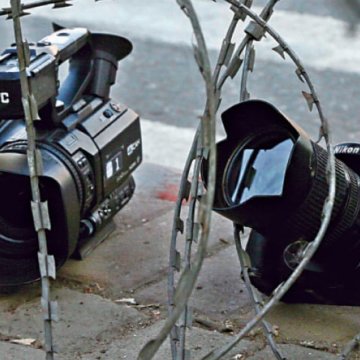- About
- Topics
- Picks
- Audio
- Story
- In-Depth
- Opinion
- News
- Donate
- Signup for our newsletterOur Editors' Best Picks.Send
Read, Debate: Engage.
| topic: | Human Rights |
|---|---|
| located: | Pakistan |
| editor: | Shadi Khan Saif |
The hardly-earned relative and limited freedom of the press in Pakistan has been increasingly eroded mainly by state forces, particularly the powerful army, with its crude force and an array of spin-masters.
The curbs on the free press have slightly evolved from the previous crippling tactics of forcefully disappearing journalists – particularly in restive parts of the country through various proxy forces – to direct and indirect pressures on media houses to air, publish and broadcast selected content in a bid to malign public opinion. And still, the disappearances of and threats on journalists have not ended either.
When a blaze swept through multiple carriages of the Pakistan Railways last week, claiming more than 70 lives, these forces were quick to do their job – just like in many identical cases of negligence by the state institutions. The media diverted the public's attention away from the security forces’ failure to ensure flammable and other hazardous substances are not taken on board a train, as well as the overlooked standard security measures. Such negligence will indeed mostly impact the poorest and most marginalized communities of the country.
Following the deadly incident, railway minister Sheikh Rasheed Ahmad, was on television saying “breakfast exploded at a carriage in the early morning causing the fire that engulfed the whole train”, clearly spinning attention towards victim-shaming rather than saying a gas cylinder or electricity cables caused the fire.
In another paradox of the army’s much-propagated respect for the free media, rallies, speeches and interviews of certain political groups ranging from mainstream leading parties such as the Peoples’ Party, Muslim League Nawaz and Awami National Party to grassroots political movements such as Pashtun Tahafuz Movement are completely banned through invisible curbs and censor imposed with brute force.
The army’s media wing, ISPR, remains heavily involved in all political debates in the country, which has a bitter past of military rule for decades.
As the world marked International Day to End Impunity for Crimes Against Journalists on Saturday, the new tactics of silencing, threatening and maligning journalists’ work should also be considered a crime on every level.
